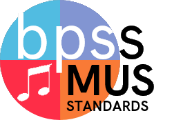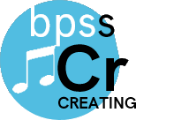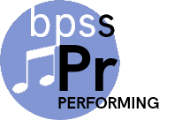MUS-MS.PrEE.06.1a
|
Performing for Traditional and Emerging Ensemble Strand
Anchor Standard 6 - Convey meaning through the presentation of artistic work.
Present
MUS-MS.PrEE.06.1a Demonstrate attention to technical accuracy and expressive qualities in prepared and improvised performances of a varied repertoire of music representing diverse cultures and styles.
|
Band Student Learning Targets
Knowledge Targets
- I can recognize a variety of time signatures
Reasoning Targets
-
- This means I can relate musical notation to a position or fingering on a musical instrument
Skills (Performance) Targets
-
- This means that I am able to go beyond a basic interpretation of the written music and incorporate expressive elements like dynamics, vibrato, ornamentation, accelerandos, and ritardandos
6th Grade Band Proficiency Scale
| Score |
|
Description |
Sample Activity
|
| 4.0 |
In addition to Score 3.0, the student is able to:
- recognize, explain and play cut time
- perform specific note values such as:
- 8th/16th note combinations
- dotted 8th/16th notes
- demonstrate fundamentals of music above grade level expectations
- correctly recognize higher level terminology relating to musical expression
|
- 1 8va chromatic scale memorized
|
| |
3.5 |
In addition to Score 3.0 performance, the student demonstrates in-depth inferences and applications regarding the more complex content with partial success. |
| 3.0 |
At the conclusion of this course the proficient student will:
(The student exhibits no major errors or omissions.)
|
- Sheet music (e.g. concert, solo, small ensemble music)
|
| |
2.5 |
The student demonstrates no major errors or omissions regarding the simpler details and processes (Score 2.0 content) and partial knowledge of the more complex ideas and processes (Score 3.0 content). |
| 2.0 |
While involved in tasks building towards proficient the student is able to:
- correctly recognize terminology relating to musical expression however, is not able to consistently execute expressive playing of their instrument.
|
- Methods Book 1 exercises 40 through 149
|
| |
1.5 |
The student demonstrates partial knowledge of the simpler details and processes (Score 2.0 content) but exhibits major errors or omissions regarding the more complex ideas and procedures (Score 3.0 content). |
| 1.0 |
While involved in tasks building towards proficient the student is able to:
- correctly recognize some terminology relating to musical expression however, is not able to execute expressive playing of their instrument.
|
- Method Book 1 exercises 1 through 39
|
| |
0.5 |
With help, the student demonstrates a partial understanding of some of the simpler details and processes (Score 2.0 content) but not the more complex ideas and processes (Score 3.0 content). |
| 0.0 |
Even with help, the student demonstrates no understanding or skill. |
- |
7th Grade Band Proficiency Scale
| Score |
|
Description |
Sample Activity
|
| 4.0 |
In addition to Score 3.0, the student is able to:
- demonstrate fundamentals of music above grade level expectations
- correctly recognize higher level terminology relating to musical expression
|
- Essential Elements Book 3 or equivalent
-
F-Eb Major
- 1 8va chromatic with music
|
| |
3.5 |
In addition to Score 3.0 performance, the student demonstrates in-depth inferences and applications regarding the more complex content with partial success. |
| 3.0 |
At the conclusion of this course the proficient student will:
-
- rolls, flams, fulcrum/hand position, and correct playing position on percussion instruments
-
- correct partials on brass instruments
- demonstrate appropriate fundamentals of music consisting of:
- correctly execute expressive playing their instrument consisting of:
(The student exhibits no major errors or omissions.)
|
- 1.5 8va chromatic scale memorized
|
| |
2.5 |
The student demonstrates no major errors or omissions regarding the simpler details and processes (Score 2.0 content) and partial knowledge of the more complex ideas and processes (Score 3.0 content). |
| 2.0 |
While involved in tasks building towards proficient the student is able to:
- correctly recognize terminology relating to musical expression however, is not able to consistently execute expressive playing of their instrument.
|
Essential Elements Book 2 exercise 101-122
Eb scale
1.5 8va chromatic scale (instrument appropriate starting note
|
| |
1.5 |
The student demonstrates partial knowledge of the simpler details and processes (Score 2.0 content) but exhibits major errors or omissions regarding the more complex ideas and procedures (Score 3.0 content). |
| 1.0 |
While involved in tasks building towards proficient the student is able to:
correctly recognize some terminology relating to musical expression however, is not able to execute expressive playing of their instrument.
|
- 1 8va chromatic scale memorized
|
| |
0.5 |
With help, the student demonstrates a partial understanding of some of the simpler details and processes (Score 2.0 content) but not the more complex ideas and processes (Score 3.0 content). |
| 0.0 |
Even with help, the student demonstrates no understanding or skill. |
- |
8th Grade Band Proficiency Scale
| Score |
|
Description |
Sample Activity
|
| 4.0 |
In addition to Score 3.0, the student demonstrates in-depth inferences and applications regarding more complex material that go beyond end of instruction expectations. |
- Individual exploration of advanced material
|
| |
3.5 |
In addition to Score 3.0 performance, the student demonstrates in-depth inferences and applications regarding the more complex content with partial success. |
| 3.0 |
At the conclusion of this course the proficient student will:
- demonstrate appropriate fundamentals of music consisting of:
-
- posture
- embouchure
- breathing
- tone quality
- steady beat
- correctly execute expressive playing their instrument consisting of:
- phrasing
- dynamics
- articulation
(The student exhibits no major errors or omissions.)
|
- Extended Chromatic scale memorized (instrument appropriate range)
|
| |
2.5 |
The student demonstrates no major errors or omissions regarding the simpler details and processes (Score 2.0 content) and partial knowledge of the more complex ideas and processes (Score 3.0 content). |
| 2.0 |
While involved in tasks building towards proficient the student is able to:
- correctly recognize terminology relating to musical expression however, is not able to consistently execute expressive playing of their instrument.
|
- Extended Chromatic scale with music (instrument appropriate range)
|
| |
1.5 |
The student demonstrates partial knowledge of the simpler details and processes (Score 2.0 content) but exhibits major errors or omissions regarding the more complex ideas and procedures (Score 3.0 content). |
| 1.0 |
While involved in tasks building towards proficient the student is able to:
- recognize, explain, play, and transition between any previously learned time signatures.
- perform specific note values such as:
-
- all 8th/16th note combinations
- 8th note triplets
-
demonstrate novice fundamentals of music
-
correctly recognize some terminology relating to musical expression however, is not able to execute expressive playing of their instrument.
|
- 1 8va chromatic with music
|
| |
0.5 |
With help, the student demonstrates a partial understanding of some of the simpler details and processes (Score 2.0 content) but not the more complex ideas and processes (Score 3.0 content). |
| 0.0 |
Even with help, the student demonstrates no understanding or skill. |
- |
Band Resources
Websites
https://www.essentialelementsinteractive.com/
http://www.metronomeonline.com/
http://dictionary.onmusic.org/
http://www.smartmusic.com/
http://www.musictheory.net
Vocabulary
Choir Student Learning Targets
Knowledge Targets
- I can recognize and identify my part in the music
- I can recall correct breathing techniques when singing
Reasoning Targets
- I can distinguish between my part and other parts within the music
Skills (Performance) Targets
- I can demonstrate correct breathing techniques
Product Targets
- I can sing my part from a student-chosen selection of our current concert music
- I can sing with dynamic contrast
- I can sing with expressive qualities and communicate the mood of the piece.
- I can sing with a supported tone appropriate to my grade level/age
Choir Proficiency Scale
| Score |
|
Description |
Sample Activity
|
| 4.0 |
In addition to Score 3.0, the student demonstrates in-depth inferences and applications regarding more complex material that go beyond end of instruction expectations.
- Singing consistently demonstrates technical accuracy and expressive qualities.
- Breathing is correct. The tone is supported to the end of the phrase.*
|
* Example of correct breathing: keeping shoulders relaxed when inhaling; chest does not rise with inhalation of breath
- Sing a student-chosen selection from concert music performed.
|
| |
3.5 |
In addition to Score 3.0 performance, the student demonstrates in-depth inferences and applications regarding the more complex content with partial success. |
| 3.0 |
The student's:
- singing demonstrates technical accuracy and expressive quality.
- breathing is mostly correct. The tone is consistently supported to the end of the phrase.*
|
|
| |
2.5 |
The student demonstrates no major errors or omissions regarding the simpler details and processes (Score 2.0 content) and partial knowledge of the more complex ideas and processes (Score 3.0 content). |
| 2.0 |
The student's:
- singing sometimes demonstrates technical accuracy and expressive quality.
- breathing is sometimes correct. The tone is occasionally supported to the end of the phrase.*
|
|
| |
1.5 |
The student demonstrates partial knowledge of the simpler details and processes (Score 2.0 content) but exhibits major errors or omissions regarding the more complex ideas and procedures (Score 3.0 content). |
| 1.0 |
The student's:
- singing demonstrates a beginning understanding of technical accuracy and expressive qualities.
- breathing is developing. The tone is rarely supported to the end of the phrase.*
|
|
| |
0.5 |
With help, the student demonstrates a partial understanding of some of the simpler details and processes (Score 2.0 content) but not the more complex ideas and processes (Score 3.0 content). |
| 0.0 |
Even with help, the student demonstrates no understanding or skill. |
|
Choir Resources
Websites
Vocabulary
Orchestra Student Learning Targets
Skills (Performance) Targets
- I can
- Use proper bow placement, speed & weight appropriate for the musical selection.
- Play all notes accurately in a steady tempo.
- Play all rhythms accurately in a steady tempo.
- Play all articulations correctly.
- Be sensitive to balance, phrasing, articulation, dynamics and generally communicate non-verbally with cues.
Orchestra Proficiency Scale
Orchestra Resources
Websites
Vocabulary |






 Performing for Traditional and Emerging Ensemble Strand
Performing for Traditional and Emerging Ensemble Strand